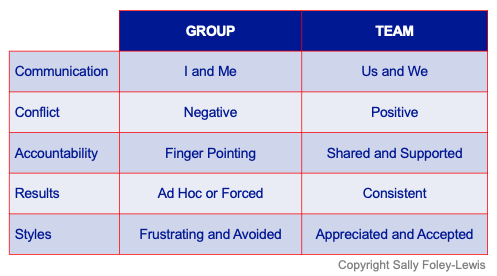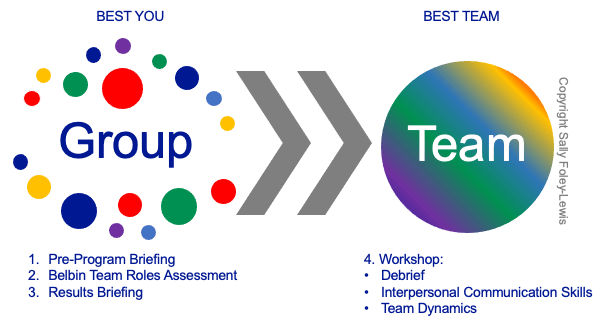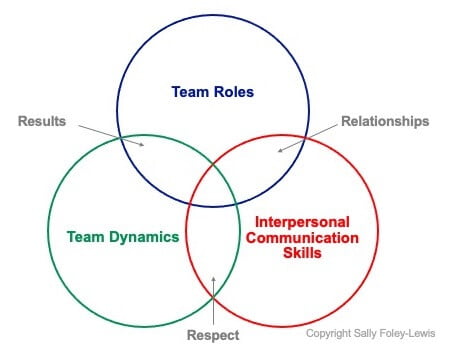Team Building
From Group to TeamIf the team aren’t aligned, communicating clearly and respectfully, and collaborating, it’s can be like herding feral cats!
From Best You to Best Team:
Teams who see differences as value adds, rather than frustrations, will always achieve more in less time, with far less stress.
Teams who pay attention to how they communicate will always handle conflict in proactive, solution focused ways.
Teams who hold each other accountable will be the first to step in and support each other to get the work done.
According to a 2020 report by Clear Company, 97% of employees and executives believe a lack of alignment within a team impacts the outcome of a task or project.
Working with thousands of managers across a diverse range of industries and countries, when it comes to team dynamics and team building, the common issues they share are:
… especially since the pandemic:
- “How can I get the team to engage when the cameras are almost always off?”
- “I.M’s, pings, Yammer, dings, Teams/Zoom, bells, emails … there were too many channels before COVID, now they’ve just ramped way up and it’s overhwhelming. I think it’s hurting the team.”
- “We don’t get to just catch up and just maintain our bond. Every Teams meeting is all business. Yes, we have to get the work done but we don’t have a kitchen or lunchroom any more. No team lunches or birthday cakes.”
- “Everyone has gone above and beyond given the changes we’ve needed to go through, I’m hesitant about wanting to add anything simply social.”
- “I can’t see them so I don’t want to bother them.”
… pre-pandemic:
- “I’m sick of people emailing when they sit right next to the person.”
- “I don’t know how to get people to respect each other and communicate properly.”
- “There’s this underlying bickering that bubbles along and I’m worried it’ll blow up.”
- “I want my people to take more responsibility for the way they speak to each other.”
- “I see people get frustrated with their work mates, they avoid each other and then work is delayed and badly affected.”
These issues leave leaders and their direct reports feeling lost, insecure and worried for their jobs.

Working with two large teams within the same organisation, the leaders of the respective teams shared very similar issues. Both leaders wanted their people to:
- communicate in a manner that was more respectful of other peoples time and expertise.
- value each other more, the work everyone is doing and what the team is trying to achieve.
- come together as a team and endeavour to reduce the silos that exist.
- take responsibility for their contribution to the team and the organisation.
Each person completed an assessment and then each team came together to undertake a thorough debrief of their results, look at the group summary in the context of what they means for them going forward; work through a range of exercises and workshop a range of team building skills through scenarios, activities and small group discussions.
Both teams (during both sessions) had everyone participating fully, asking more questions, being curious and present with each other. Some of the comments shared from the participants:
“I loved being able to understand why I sometimes feel like no one gets me. I now realise I need to adjust how and what I say so that I’m understood.”
“I tended to avoid [this person] because I was often frustrated by them, now I get it. I can now see that they behave and offer a perspective different to mine which now value for helping me have a deeper view on our projects and work. This, just this alone, has changed my whole approach to working here!”
From Group To Team
A blend of assessment and workshop to create productive, collaborative and high performing teams. The key major areas this program covers are:
- Understanding team roles
- Interpersonal communication skills
- Understanding team dynamics

This program will equip your people with:
- a deeper understanding of their unique team role and how they can play to their strengths.
- a greater appreication of their colleagues and value other’s contributions to the team, the work and the organisation.
- stronger and more respectful and connected relationships with their colleagues.
- tips and strategies for quality interpersonal communication skills.
- the knowledge to understand group dynamics and what part they can play in strengthening the team.
- tips to ensure conflict is positive and solutions oriented.
The is program is ideal for:
- Any team that has had significant change or turnover.
- A team that hasn’t had many opportunities to come together.
- A team that is struggling with communication and conflict.
- Any leader and team who wants to gain a deeper insight into their roles and gaps the team may have.
The program is not ideal for teams who are:
- Not willing to accept responsiblity for their own behaviour.
- Looking for a fun day (nothing wrong with fun team days but they are not this).

Step One: Team Roles
When individuals understand how they can play to their strengths and can see the strengths in their team mates, they can collaborate and communicate far more effectively. Their relationships are stronger; they are able to resolve issues faster; and they can come together quicker during a crisis.

Dr Meredith Belbin and his team discovered that there are nine clusters of behaviour – these were called ‘ Belbin Team Roles’ Each team needs access to each of the nine Belbin Team Role behaviours to become a high performing team. However, this doesn’t mean that every team requires nine people! Most people will have two or three Belbin Team Roles that they are most comfortable with, and this can change over time. Each Belbin Team Role has strengths and weaknesses, and each Team Role has equal importance.
However, not all are always required at the same time – it is important to first look at the team objectives, and work out which tasks need to be undertaken. Once this has been done, discussions can take place regarding which and when each Belbin Team Role behaviour should be utilised.
By using Belbin, individuals have a greater self-understanding of their strengths, which leads to more effective communication between colleagues and managers. Great teams can be put together, existing teams can be understood and improved, and everyone can feel that they are making a difference in the workplace.
None of this is possible without an individual completing a Belbin Self-Perception Inventory and asking for feedback from their colleagues. The Belbin Individual Report that is produced will help pin-point individual Belbin Team Role strengths (and weaknesses) to communicate and share with the rest of the team.
Step Two: Interpersonal Communication Skills
Through a blend of thorough debrief of the Belbin Team Roles reports and workshopping the power of interpersonal communication skills, the team can take greater responsibility for their own behaviours, deeper respect for their team and the important work each member does.
The Workshop is custom designed to suit your team. Most programs include:
- Debrief of the Belbin Team Roles reports (depending on team size, this is usually a half day)
- Defining Interpersonal Communication:
- Being assertive
- Conflict resolution tips
- The power of questions
- Listening for improved communication
- The impact of email on teams
Step Three: Team Dynamics
When the team can see how they are functioning as a team, they will are equipped to step in, support and guide each other. Aiming for a self-leading, high performance team means the manager or leader can step back and into the role of coach. When teams members can see beyond themselves they have empathy and a wider perspective. This helps the whole team achieve results. The Workshop includes:
- Understanding empathy
- Team stages
- Team decision making tips and tools
Small group face to face, COVID compliant.
Virtual program for large and/or remote teams.
Couldn’t recommend Sally highly enough. Sally took our after lunch session of our National conference and got the group really going. She was engaging, developed relationships with individuals within the group and even more impressively arrived early to watch our key note speaker to ensure some continuity in the presentations. Thank you Sally for all your work leading up to, during and after the session.
Sally recently spoke at our Teachers Matter Conference in Brisbane. She was fantastic; knowledgable, engaging and skilful. She led our teachers through understanding their personality types and that of others, to ensure they have the skills to work together productively in teams. Participants laughed, learned and had great aha moments. Thanks for being a joy to work with, entertaining, organised and fun!
What a fantastic session at our recent conference! Sally shared examples and information that were relatable, equipping us with effective productivity strategies and reminded us of good habits we may have let slide. From GM and through the entire group, everyone has learnt new tools and the buzz following the event indicates people are actually implementing them. Productive times (as a result of the personal graphs), chunking and email etiquette are only a few of the solutions in practice following the session. Thanks Sally for sharing your knowledge and practical tips, and throwing in some laughs! Sally’s information, tools, energy and interaction meant it was the best session of the conference!
